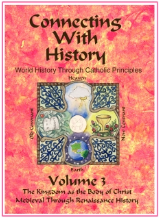 I continue to be amazed by MEP and my kids continue to love it. Because MEP is so different, it took a year for all 3 to be able to complete one MEP lesson each school day.
I continue to be amazed by MEP and my kids continue to love it. Because MEP is so different, it took a year for all 3 to be able to complete one MEP lesson each school day.Ds#1 is on the 6th and final book of Y3. Interestingly, MEP is just now introducing vertical addition--you know, listing the numbers vertically and then adding with regrouping. Finally, his 4 years of Math U See could be used for MEP and he of course breezed through these problems.
Those of you not familiar with MEP might be scratching your heads. What is MEP doing in all the time between learning addition and learning vertical addition? MEP teaches arithmetic using small numbers and then students use these basic skills to learn a wide variety of other math concepts and applications--continuing sequences, filling in tables, logic puzzles, money and metric (which focuses on units, 10s, 100s, and 1000s,) geometry, algebra, order of operation, and of course, word problems. They use small number arithmetic so much that moving to 3 digit numbers or vertical math with regrouping is simple because they already understand the concepts. It is just another or bigger way of doing what they have already been doing.

For example Ds#2 is doing Y2. MEP introduced multiplication and division together, one being the reverse of the other. And while most of his calculations are on the multiplication chart, he sometimes has to do things like 68 ÷ 4. First he says he doesn't know that, but he knows that 68 is 40 + 28, and he can divide each of those by 4, which is 10 + 7 = 17. He learns early on to regroup numbers because it is useful, not because it is what you need to do vertical arithmetic.
It is as if typical math programs put the cart before the horse. They certainly present the concepts of place value and regrouping enough for kids to get an understanding for them. But you better pick it up quickly because you're going to be adding 5 digit numbers soon! The message is that you need these skills in order to do the algorithm without any understanding of the greater mathematical picture.
I invest 40 minutes each for Ds#1 and Ds#2, and 20 minutes for Ds#3 teaching math and it is worth every minute. And to think such a math program is free.















3 comments:
We started using MEP about 6 weeks ago and are LOVING it! My daughter is using level 5. She actually completed grade 5 of Teaching Textbooks & ALEKS last year, but level 5 is still a challenge for her. I'm AMAZED at what a wonderful program it is! I've been meaning to post about it and spread the word. I think it is just incredible how it teaches the kids to really think! I know it is stretching my daughter. :-)
We are new to MEP from MUS only a month ago! I too love it and have been working my boys into where they are going to be comfortable continuing... But you are SO right. My boys are in Y4, one in a and the other in b. I wish they had started in MEP! I feel they have missed a seriously secure foundation! Well, we are going to recup it! Anyway, we too are learning tons and enjoying it (for the most part ;)
Amy in Peru
http://fisheracademy.blogspot.com
Grat post. I'm now looking forward to your writings on Englemann.
BTW, I did not know you had this blog, I'll add it to my blogroll, and the link to my MEP post.
Post a Comment